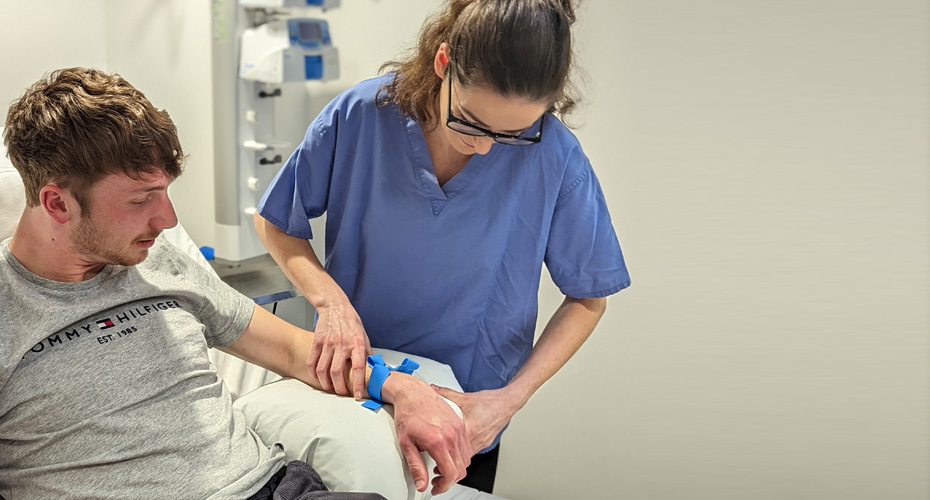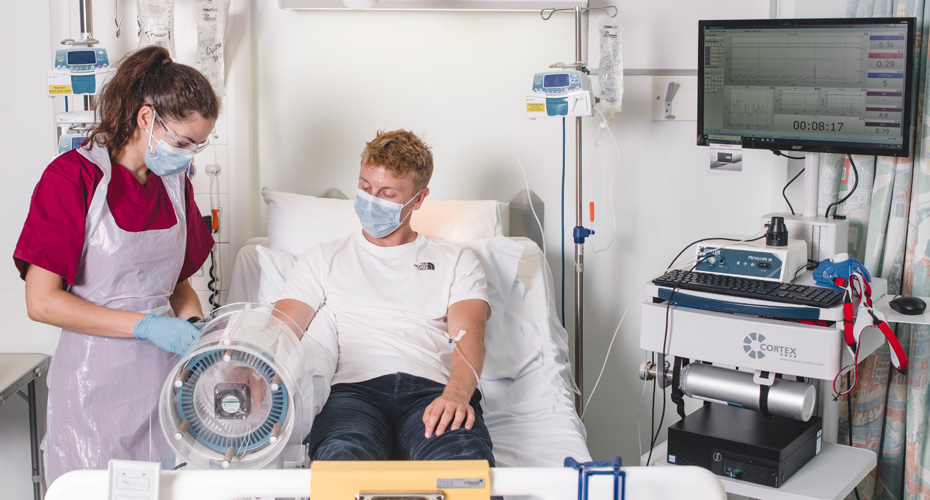Clinical nutrition
Led by Dr Raquel Revuelta Iniesta, our clinical nutrition research primarily explores the interface between nutrition and chronic conditions, mainly cancer, in children and young people during and after treatment.
It is based on the concept of “nutritional status”, which refers to the “health and well‐being of individuals and populations as influenced by their intake and utilisation of nutrients.”
Our research covers three main themes:
- Childhood cancer
- Nutrition in children and teenagers with autism
- Nutrition and muscle health
Current research projects:
Osteosarcoma

Staying well-nourished throughout treatment for osteosarcoma can be challenging. Due to intensive, frequent chemotherapy that affects taste, appetite and the ability to digest and absorb nutrients, many children lose weight and strength.
This has been shown to be linked to their risk of catching infections, and to significantly impair their quality of life and ability to tolerate the effects of chemotherapy itself. Losing weight can also affect how much chemotherapy is given, sometimes resulting in reduced doses and therefore possibly less effective treatment.
Nutrition is supported differently across centres for children having osteosarcoma treatment, both within the UK and internationally. Some clinical teams recommend placing a surgical feeding tube (gastrostomy) into the stomach at diagnosis, whilst others adopt a ‘wait and see’ approach and, if nutrition deteriorates, then recommend a feeding tube is passed through the nose into the stomach (nasogastric tube).
There are potential benefits and disadvantages to both options: a gastrostomy gives a reliable route for nutrition to be given, but it can be an infection risk. Whereas nasogastric tubes are easily inserted at the bedside, but they are clearly visible, can be vomited out and the insertion procedure and sensation of the tube in the throat can be upsetting for some.
Unfortunately there is little evidence to show us which is more effective in supporting nutrition, and also most acceptable to children undergoing this treatment.
Our aims
This project has two aims:
- To look back through medical notes to compare practice at two primary treatment centres to work out if nutritional support strategies used in these two centres influence nutritional status.
- To find out if there are differences in the time spent in hospital as a result of complications and the safety of both options.
Funding
Children's Cancer and Leukaemia Group (CCLG)
Researcher
Laura Sealy (Haematology, Oncology and Stem Cell Transplants), Department of Paediatric Nutrition and Dietetics, University Hospitals Bristol & Weston NHS Trust
Cancer treatment

Nutritional Assessment and Management of Paediatric Cancer Patients during treatment
The aims of this project are to investigate the prevalence of malnutrition, patterns of change in nutritional status and factors contributing to malnutrition in children and young people diagnosed and treated for cancer.
This will help identify what group of patients have malnutrition and when it occurs, to help develop nutrition screening and nutritional interventions.
Funding bodies
- Fergus Maclay Leukaemia Trust
- Cancer and Leukaemia Fund and GI-Research Fund
- Queen Margaret University
Collaborators
- Dr Mark Brougham (Dept. Paediatric Haematology and Oncology, Royal Hospital for Children and Young People, Edinburgh)
- Prof David Wilson (Child Life and Health, University of Edinburgh; Dept. of Paediatric Gastroenterology and Nutrition, Royal Hospital for Children and Young People, Edinburgh)
Childhood cancer survivors

The role of diet and physical activity on cardiovascular health in childhood cancer survivors (CCSs)
Cardiovascular disease (CVD) is the leading non-malignant cause of death in CCSs, and the risk of mortality in CCSs is 7- fold higher than in age-matched peers. Some studies consistently show the heightened risk and early onset (younger than 30 years) of cardiovascular events, cardiac dysfunction and CVD risk factors in CCSs.
Diet and physical activity (PA) play a significant role in preventing the occurrence of CVD risk factors, as well as the development of cardiac dysfunction and CVD. While the impact of diet and PA on cardiovascular health has been extensively studied in the general population, their role in the cardiovascular health of CCSs is not well-established. There are no specific diet and PA guidelines for CCSs in any country. The diet and PA recommendations for general populations may provide some guidance; however, these guidelines may not fully address the unique needs of CCSs.
Consequently, there is a gap in understanding the association between diet and physical activity and cardiovascular health in CCSs.
The overarching aim of this project is to fill the knowledge gap in this field, investigate the role of diet and PA in cardiovascular health of CCSs.
Funding
Chinese Scholarship
PhD student
Ruijie Li
Research Centre
Children’s Health and Exercise Research Centre (CHERC)
Collaborators
Partners
Dr Fabien Belle and Prof Christina Schindera (Institute of Social and Preventive Medicine), University of Bern, Switzerland
Autism Spectrum Disorders

Nutrition in children and teenagers diagnosed with Autism Spectrum Disorders
Children with Autistic Spectrum Disorders (ASDs) may be nutritionally vulnerable due to their selective eating patterns, food neophobia, limited food repertoire, and sensory sensitivity, which predisposes them to nutrient deficiencies and may lead to malnutrition (undernutrition and obesity), poor growth and development.
In some cases, this may be worsened by implementing unnecessary restrictive diets, such as casein-free and gluten-free, intending to reduce ASD symptoms.
In order to perform nutritional interventions in the future, it is first necessary to identify the dietary needs and deficiencies of this population and how these could be implemented in practice.
Using a mixed-method approach, the aim of this project is to explore the dietary intake of children diagnosed with Autism Spectrum Disorder (ASD), challenges experienced by parents and caregivers, and potential enablers that could facilitate nutritional interventions in the future.
PhD student
Research Centre
Children’s Health and Exercise Research Centre (CHERC)
Collaborators
Vitamin D and muscle

VIPER study: Effects of VItamin D SupplEmentation on muscle pRotein synthesis
The overarching aim of this project is to investigate if vitamin D supplementation can increase muscle mass and strength and to explore if the cellular pathways identified in animal studies translate to humans (in vivo studies).
Healthy adults maintain muscle tissue by continuously building up and breaking down muscle proteins throughout the day. This happens due to the daily influences of nutrition and physical activity. Specifically, recent studies have shown that vitamin D is essential for maintaining muscle mass by activating anabolic pathways (in response to anabolic stimuli) involved in muscle protein synthesis (MPS). Although, various candidate molecules and physiological pathways have been identified in vitro and animal models, it is unclear whether these findings translate into in vivo human models.
This project tests the hypothesis that vitamin D supplementation increases the human MPS response to anabolic stimuli (feeding and exercise) by stimulating the mTOR pathway.
Funding
- Society for Endocrinology
- In collaboration with the Nutritional Physiology Research Group
Collaborators
Skeletal muscle in ALL survivors

SUNRISE study: Skeletal mUscle aNabolic sensitivity responses to feedIng in Survivors of childhood AcutE Lymphoblastic Leukaemia
Survivors of childhood acute lymphoblastic leukaemia experience significant long-term complications, such as frailty, and tend to adopt poorer dietary and lifestyle behaviours. Most research focuses on novel drug development, but identifying optimal nutrition strategies, which may fundamentally ameliorate or prevent frailty in survivors of ALL, have received limited attention.
We know that muscle size is determined by the rate at which they are able to grow and make new proteins (protein synthesis). Protein synthesis is stimulated by dietary protein. Dietary protein intake in survivors of ALL do not differ from the general population, which suggests that there is an inability of muscle protein synthesis to respond normally to dietary protein. This has previously been shown to be a reason for low muscle size in adolescents with Crohn’s disease.
The aim of this project is to investigate the response of muscle protein synthesis to dietary protein in survivors of ALL. The results would be a stepping stone to designing tailored dietary interventions that help ameliorate frailty in ALL survivors.
Research group
In collaboration with the Nutritional Physiology Research Group